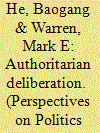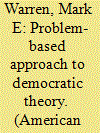| Srl | Item |
| 1 |
ID:
105246


|
|
|
|
|
| Publication |
2011.
|
| Summary/Abstract |
Authoritarian rule in China is now permeated by a wide variety of deliberative practices. These practices combine authoritarian concentrations of power with deliberative influence, producing the apparent anomaly of authoritarian deliberation. Although deliberation is usually associated with democracy, they are distinct phenomena. Democracy involves the inclusion of individuals in matters that affect them through distributions of empowerments such as votes and rights. Deliberation is a mode of communication involving persuasion-based influence. Combinations of non-inclusive power and deliberative influence-authoritarian deliberation-are readily identifiable in China, probably reflecting failures of command authoritarianism under the conditions of complexity and pluralism produced by market-oriented development. The concept of authoritarian deliberation frames two possible trajectories of political development in China: the increasing use of deliberative practices stabilizes and strengthens authoritarian rule, or deliberative practices serve as a leading edge of democratization.
|
|
|
|
|
|
|
|
|
|
|
|
|
|
|
|
| 2 |
ID:
154150


|
|
|
|
|
| Summary/Abstract |
Authoritarian rule in China increasingly involves a wide variety of deliberative practices. These practices combine authoritarian command with deliberative influence, producing the apparent anomaly of authoritarian deliberation. Although deliberation and democracy are usually found together, they are distinct phenomena. Democracy involves the inclusion of individuals in matters that affect them through distributions of empowerments like votes and rights. Deliberation is the kind of communication that involves persuasion-based influence. Combinations of command-based power and deliberative influence – like authoritarian deliberation – are now pervading Chinese politics, likely a consequence of the failures of command authoritarianism under the conditions of complexity and pluralism produced by market-oriented development. The concept of authoritarian deliberation frames two possible trajectories of political development in China. One possibility is that the increasing use of deliberative practices stabilizes and strengthens authoritarian rule. An alternative possibility is that deliberative practices serve as a leading edge of democratization.
|
|
|
|
|
|
|
|
|
|
|
|
|
|
|
|
| 3 |
ID:
153763


|
|
|
|
|
| Summary/Abstract |
Over the last few decades, democratic theory has grown dramatically in its power and sophistication, fueled by debates among models of democracy. But these debates are increasingly unproductive. Model-based strategies encourage theorists to overgeneralize the place and functions of ideal typical features of democracy, such as deliberation or elections. Here I sketch an alternative strategy based on the question: What kinds of problems does a political system need to solve to count as “democratic”? I suggest three general kinds: it should empower inclusions, form collective agendas and wills, and have capacities to make collective decisions. We can view common practices such as voting and deliberating as means for addressing these problems, and theorize institutional mixes of practices that would maximize a political system's democratic problem-solving capacities. The resulting theories will be both normatively robust and sufficiently fine-grained to frame democratic problems, possibilities, and deficits in complex polities.
|
|
|
|
|
|
|
|
|
|
|
|
|
|
|
|
| 4 |
ID:
110552


|
|
|
|
|
| Publication |
2011.
|
| Summary/Abstract |
Democracy is about including those who are potentially affected by collective decisions in making those decisions. For this reason, contemporary democratic theory primarily assumes membership combined with effective voice. An alternative to voice is exit: Dissatisfied members may choose to leave a group rather than voice their displeasure. Rights and capacities for exit can function as low-cost, effective empowerments, particularly for those without voice. But because contemporary democratic theory often dismisses exit as appropriate only for economic markets, the democratic potentials of exit have rarely been theorized. Exit-based empowerments should be as central to the design and integrity of democracy as distributions of votes and voice, long considered its key structural features. When they are integrated into other democratic devices, exit-based empowerments should generate and widely distribute usable powers for those who need them most, evoke responsiveness from elites, induce voice, discipline monopoly, and underwrite vibrant and pluralistic societies.
|
|
|
|
|
|
|
|
|
|
|
|
|
|
|
|